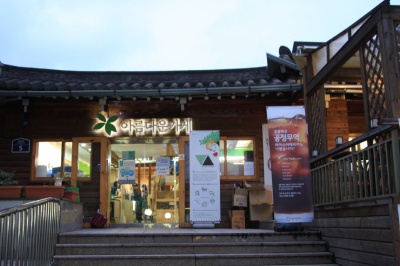Looking at status of second-hand culture in Korea, Benefit Korean society through sharing: Beautiful Store

Looking at status of second-hand culture in Korea
A young girl sitting in front of the piano bursts into tears as soon as her teacher hands her a stack of old music books. Even though the books were in fine conditions, the fact that somebody had already used those books made her upset.
“I never liked second-hand books, so my parents ended up buying a whole new stack,” Kim Do-yeon (Dongguk University, 2) said, recalling one of the most vivid memories during her childhood regarding second-hand goods. “I was thrilled as soon as I received brand-new books. At that time, I thought using something that somebody had already owned in the past was totally embarrassing.”
Participating in second-hand trade is not a very familiar method of consumption in Korea. Unlike the UK, Koreans have low awareness toward second-hand culture.
Based on a survey by Trend Monitor targeting Korean people aged from 14 to 49, 45 percent answered that the reason for not using second-hand goods is because quality of those goods is not guaranteed compared to those of the new ones.
“I feel reluctant to purchase second-hand goods since their conditions are hard to tell at first sight,” Park Jin-sun (Hanyang University, 2) said. “It is easy to see the case of fraud online regarding second-hand trade. These incidents tend to form the negative awareness towards second-hand.”
On the other hand, experts have concluded that Korean people’s pessimistic behavior toward second-hand culture is derived from the idea that all personal belongings have spiritual values.
“Korean people grant special meanings to each of their belongings and believe that those items have certain individuality,” said professor Won Yoon-hee (University of Seoul), the president of International Council for Nonprofit Management. “This kind of behavior discourages people from using other people’s possessions.”
Although people in the UK also fundamentally believe that all possessions bear spiritual meanings, they respect values of others’ owned goods as well.
“People in the UK consider second-hand goods as objects that need to be adopted and taken care of,” said Carolina Balthazar, a Ph.D. student at the University College London working on research about second-hand culture in the UK. “Second-hand goods that have been passed from hand to hand hold their own historical values, which is why they should be cherished by all.”
Even though Korea has retained a conservative attitude toward second-hand culture, people who recognize the value and significance of second-hand gather and make differences within the Korean society.
Benefit Korean society through sharing: Beautiful Store
In the middle of Anguk Street, there stands an old-fashioned Korean style house with a traditional atmosphere. The sign that reads “Beautiful Store” welcomes customers passing by. It is the first branch of the Beautiful Store.
Launched in 2002 in Korea benchmarking the model of Oxfam, Beautiful Store is working under the mission of “Making a beautiful world of sharing and circulation where everyone participates.” Beautiful Store converts donated products to monetary donation and operates more than 100 stores across the nation. Beautiful Store accepts volunteers ranging from university students to middle-aged people, just as the charity shops in the UK do.
“There are around 150 volunteers working here at the first branch of the Beautiful Store,” said a manager of the Beautiful Store located in Anguk district. “During the day when most university students are at school, middle-aged volunteers work whereas young people work as volunteers in the evening.”
Most volunteers express satisfaction towards their jobs. It is also an opportunity for them to change their behavior towards second-hand goods.
“Before I worked here, I had considered second-hand as something that cannot be used,” said Jung Sol (Hansung University, 4), who has worked as a volunteer at Beautiful Store for almost five years. “I learned that unwanted items could also become redistributed and benefit somebody who needs help.”
Along with the charity shops, Beautiful Store operates regular or special flea markets in order to promote the second-hand culture related to recycling, donating and sharing. Instead of charging fees, it collects part of the sales profits as donation to help neighbors who suffer hardships and to raise the awareness of environmentally friendly practices on a daily basis.

